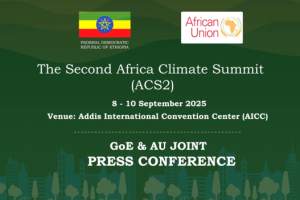BY GIRMACHEW GASHAW
In this globalized world, countries will not survive unless they are gaining the direct or indirect support of others in many respects. As the bible says, “A man reaps what he sows. The one who sows to please his sinful nature, from that nature will reap destruction; the one who sows to please the Spirit, from the Spirit will reap eternal life. Likewise, countries connected to natural resources should work together for shared benefits.
According to the World Bank, Nile Basin covers around 10 per cent of Africa’s landmass, the river underpins livelihoods for over 200 million people. The Nile is shared by 10 countries, each with different needs and priorities, but also with common challenges – increasing demand for water, environmental degradation, recurrent flooding, droughts, and energy insecurity.
Even though Ethiopia contributes some 86 per cent of the Nile waters, the downstream countries still remained hostile to cooperate with Ethiopia in terms of ensuring environmental protection despite the Nile Basin Initiative (NBI) was born 20 years ago. Mainly Egypt and Sudan have not been willing to negotiate with Ethiopia and contribute their share for the protection of the Nile basin.
Recognizing cooperation around transboundary water is difficult, Ethiopia has been implementing various green initiatives in order to protect the basin and increase the Nile waters instead of requesting payment for ecosystem service from the downstream countries, told Girmachew Addisu, Hydrologist and Former Irrigation and Drainage Monitoring Specialist at Abbay Basin Authority.
In any case, upper riparian countries deserve payment for ecosystem services from downstream countries for the water development activities they undertake in the basin.
This is because the conservation activities along the basin in terms of sustainable water and underground water supply among others will benefit downstream countries, Girmachew said.
“In addition, conservation and water development activities upstream will support fishery and reduce siltation downstream,” he added.
“That is why I say Ethiopia deserves payment for ecosystem services. Presently, the idea works in many countries and basins,” he said. “Accordingly, upper riparian countries develop the water and undertake conservation activities and receive reasonable ecosystem services payment. Limpopo in Southern Africa and Mekong river basin in Asia are some of the basins that are applying for ecosystem services payment,” the hydrologist added.
However, in the late 20th century floods wreaked havoc on millions of Sudanese and South Sudanese because they were unaware of heavy rainfall upstream in Ethiopia. Without information about upstream flows, adequate preparation and responses were difficult. The costs of limited cooperation were clear.
While the waters of the Nile underpin current economic development and livelihoods and offer significant further potential, cooperation around this remarkable shared resource is critical to reducing water-related risks and building long-lasting economic development, Girmachew added.
Solving the lack of cooperation seemed an intractable problem. While the Nile basin countries shared similar challenges in growing water demand, environmental degradation, recurrent flooding, droughts, and energy insecurity, distrust and unilateral perspectives were ingrained. In addition, the countries had inadequate information, institutions and capacity, which crippled the ability of countries to cooperate, he stated.
Today, one can see the Nile region that comes together on a regular basis, making decisions that benefit not just the people of one country, but those of several. Now the countries share information; in Sudan and South Sudan, for example, early flood warnings are issued when rainfall in Ethiopia reaches a threshold. Notwithstanding challenges, we see countries collaborating to conserve and share a vital resource rather than simply scrambling to claim it, the document of the World Bank indicated.
Progress made towards cooperation around shared water resources in the Nile basin has not gone without challenges. Language and culture barriers, differences in wealth and capacity, and issues of conflict and fragility have beleaguered cooperation efforts through the years. But with poverty alleviation and economic growth in the region being highly dependent on the sustainable use and management of the shared Nile waters, the countries persisted.
The formation of the Nile Basin Initiative (NBI) – an intergovernmental technical partnership of ten Nile Basin countries – 20 years ago created a powerful forum for discussion and exploration of the possibilities of cooperative water resources management. But the NBI has provided more than a central meeting place. Through efforts in capacity and institution building, the generation and sharing of knowledge, and support for project preparation and ongoing monitoring, the NBI has been able to break through the so-called glass wall that separated Nile basin countries before its founding.
Through its robust and cross-cutting support of cooperative efforts in the Nile basin, the NBI has been able to help basin countries negotiate, agree to, and prepare 30 projects with regional, shared benefits. Support for institutions and policies at the national level has led to increased capacity within the basin to advance a cooperative development agenda for water resources.
The journey of cooperation over the Nile region has been a long one, but the fruits of the effort are evident. The establishment and work of the NBI have led to a pipeline of nearly 6 billion USD for investment projects. At the 20th anniversary of the NBI in February 2019, nearly 1.5 billion USD of funding is under implementation.
From gender inclusion to information gathering to power generation and transmission, the NBI supports cooperation in several key areas for the Nile basin. For example, the NBI has facilitated a number of energy projects, from those that extend and link transmission lines to achieve interconnections to those that promote responsible development and generation of hydropower. They’ve also worked to ensure that projects build climate resilience, conserve and restore watersheds, and provide benefits to women. Further, the NBI’s institutionalization of knowledge sharing means less devastation from floods, and the adoption of regional dam management standards means less risk of dam failure.
The breadth and depth of projects facilitated and implemented by NBI and its subsidiary organizations ultimately mean they are bringing change to millions of people living in poverty.
Collaboration in the Nile basin has increased dramatically in the 20 years since the establishment of NBI, but there is still much to be done, including the establishment of a more formal river basin organization once the political agreement has been reached.
Fortunately, successfully negotiating and completing a cooperative project, be it small or large, often means the countries involved are primed to work together on bigger and/or more complex projects. Since Nile countries have successfully collaborated to plan and secure funding for projects of all types and sizes, they are able to build on their ability to tap into the benefits of cooperative water resources management and protect people and livelihoods from water-related risks.
In the nutshell, as they are seeking the benefit from the Nile River, countries should stand by the side of Ethiopia and strengthen cooperation to protect the ecosystem than ever before so as to increase the flow of the water.
The Ethiopian Herald October 3/2021




